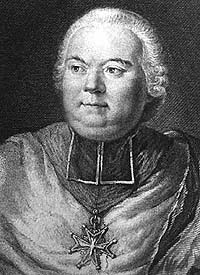Abbé de Bernis
|
Francois-Joachim de Pierre, Cardinal de Bernis Comte de Lyon |
|
|---|---|
 |
|
| Born |
22 May 1715 Saint-Marcel d'Ardèche |
| Died | 3 November 1794 (aged 79) |
| Nationality | French |
| Education | Lycée Louis-le-Grand |
| Occupation | diplomat |
| Known for | epigrams |
François-Joachim de Pierre de Bernis (22 May 1715 – 3 November 1794) was a French cardinal and statesman. He was the sixth member elected to occupy seat 3 of the Académie française in 1744.
Born at Saint-Marcel d'Ardèche, Bernis was of a noble, but impoverished family, and, being a younger son, was intended for the church. His father, Joachim de Pierre, seigneur de Bernis, was a captain of cavalry and in 1697 was married to Marie Elisabeth, daughter of Nicolas de Chastel de Condres. The cardinal's elder brother was Philippe Charles François (1714-1774), baron de Pierrebourg, marquis de Pierre de Bernis, seigneur de Saint-Marcel. He was educated at the Louis-le-Grand college and the seminary of Saint-Sulpice, Paris, but did not take holy orders till 1755.
Bernis became known as one of the most expert epigrammatists in the gay society of Louis XV of France's court, and by his verses won the friendship of Madame de Pompadour, the royal mistress, who obtained for him an apartment, furnished at her expense, in the Tuileries, and a yearly pension of 1500 livres. Voltaire admired his verses, calling him Babet la bouquetière. In 1751, Bernis was appointed to the French embassy at Venice, where he acted, to the satisfaction of both parties, as mediator between the republic and Pope Benedict XIV. During his stay in Venice he received subdeacon's orders, and on his return to France in 1755 was made a papal councillor of state.
Bernis took an important part in the delicate negotiations between France and Austria which preceded the Seven Years' War. He regarded the alliance purely as a temporary expedient, and did not propose to employ the whole forces of France in a general war. But he was overruled by his colleagues. Bernis became secretary for foreign affairs on 27 June 1757, but owing to his attempts to counteract the spendthrift policy of the marquise de Pompadour and her creatures, he fell into disgrace and was in December 1758 banished to Soissons by Louis XV, where he remained in retirement for six years. In the previous November he had been created cardinal by Pope Clement XIII.
...
Wikipedia
